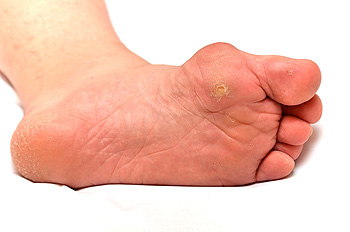
 A bunion is described as a bony protrusion that forms on the side of the big toe. It may be unsightly and uncomfortable and is generally considered to be a deformity. Research has shown that specific bone structure, which may cause bunions to develop, may be inherited, in addition to having ailments that may include flat feet. Additionally, obesity and pregnancy may play a significant role in the formation of bunions, and this may be a result of the added weight the feet must endure. If you choose to wear shoes that do not have adequate room for the toes to move about in, a bunion may develop, which may lead to other foot conditions such as corns and calluses. If you notice a bump on the side of your big toe, it is suggested to seek the counsel of a podiatrist, so a proper diagnosis can be performed.
A bunion is described as a bony protrusion that forms on the side of the big toe. It may be unsightly and uncomfortable and is generally considered to be a deformity. Research has shown that specific bone structure, which may cause bunions to develop, may be inherited, in addition to having ailments that may include flat feet. Additionally, obesity and pregnancy may play a significant role in the formation of bunions, and this may be a result of the added weight the feet must endure. If you choose to wear shoes that do not have adequate room for the toes to move about in, a bunion may develop, which may lead to other foot conditions such as corns and calluses. If you notice a bump on the side of your big toe, it is suggested to seek the counsel of a podiatrist, so a proper diagnosis can be performed.
If you are suffering from bunions, contact Dr. Sybil J. Fisher of Texas. Our doctor can provide the care you need to keep you pain-free and on your feet.
What Is a Bunion?
A bunion is formed of swollen tissue or an enlargement of boney growth, usually located at the base joint of the toe that connects to the foot. The swelling occurs due to the bones in the big toe shifting inward, which impacts the other toes of the foot. This causes the area around the base of the big toe to become inflamed and painful.
Why Do Bunions Form?
Genetics – Susceptibility to bunions are often hereditary
Stress on the feet – Poorly fitted and uncomfortable footwear that places stress on feet, such as heels, can worsen existing bunions
How Are Bunions Diagnosed?
Doctors often perform two tests – blood tests and x-rays – when trying to diagnose bunions, especially in the early stages of development. Blood tests help determine if the foot pain is being caused by something else, such as arthritis, while x-rays provide a clear picture of your bone structure to your doctor.
How Are Bunions Treated?
If you have any questions, please feel free to contact one of our offices located in Houston and Sugar Land, TX . We offer the newest diagnostic and treatment technologies for all your foot care needs.
Read more about BunionsCopyright © 2016 S.J. Fisher DPM | Site Map | Design by: Podiatry Content Connection